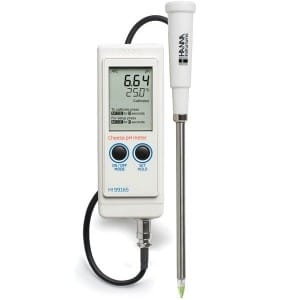
Hanna Instruments-99165 Portable pH/Temperature Meter for Cheese Analysis
The Hanna Instruments-99165 is a portable pH and temperature meter designed specifically for cheese analysis.
This meter is supplied with the FC242D pH electrode with internal temperature sensor. The FC242D is composed of glass and has a conical tip that allows for penetration into semi-solids and emulsions for the direct measurement of pH in cheese products.
The Hanna Instruments-99165 features automatic calibration at one or two points with two sets of buffers. All calibrations and measurements are automatically compensated for temperature variations due to the internal temperature sensor in the FC242D electrode.
The split level LCD displays both pH and temperature readings, along with indicators for reading stability, battery percentage and calibration instructions.
Key features
- Application specific electrode
- Automatic temperature compensation (ATC)
- Stability indicator for accurate data recording
Application importance
pH is an essential measurement throughout the entire cheese making process. From the initial measurements of incoming milk to the final measurements of ripened cheese, pH is the most important parameter for cheese quality and safety control.
Acidification of milk begins with the addition of bacterial culture and rennet. The bacteria consume lactose and create lactic acid as a by-product of fermentation, lowering the pH of the milk. Once the milk reaches a particular pH, the rennet is added. The enzymes in rennet help to speed up curdling and create a firmer substance. For cheesemakers that dilute their rennet, the pH of the dilution water is also critical; water that is near pH 7 or higher can deactivate the rennet, causing problems with coagulation .
Once the curds are cut, stirred, and cooked, the liquid whey must be drained. The pH of whey at draining directly affects the composition and texture of the final cheese product. Whey that has a relatively high pH contributes to higher levels of calcium and phosphate and results in a stronger curd. Typical pH levels at draining can vary depending on the type of cheese; for example, Swiss cheese is drained between pH 6.3 and 6.5 while Cheddar cheese is drained between pH 6.0 and 6.2 .
Frequently Asked Questions
Clear answers to help you choose the right water testing solution with confidence
Which brands of water testing kits do you supply?
Do you provide kits for both home and professional use?
Yes — whether you’re a pool or spa owner, aquarium keeper, utility company, or a university laboratory, we have the right solution for your needs.
Can I arrange servicing or calibration for my photometer?
Absolutely. We also provide servicing and calibration to keep your photometers accurate and reliable.
How quickly do you dispatch orders?
Orders placed before 2:30 pm (Monday–Friday) are dispatched the same day. We also ship on Saturdays for your convenience.
Which couriers do you use for delivery?
We deliver through UPS, DPD, and Royal Mail. You can also choose to upgrade to next-day delivery at checkout.
What is your return policy?
We accept returns within 14 days of delivery provided the items are unused, in their original packaging, and in resalable condition. Please contact our team before returning any items.
Can I place bulk or business orders?
Yes, we welcome bulk, trade, and institutional orders. For tailored pricing or large quantities, please get in touch with us directly.
How can I get help if I’m unsure which kit to buy?
You can call us at 📞 +44 (0)115888 2726 and our team will guide you in choosing the most suitable kit for your needs.
